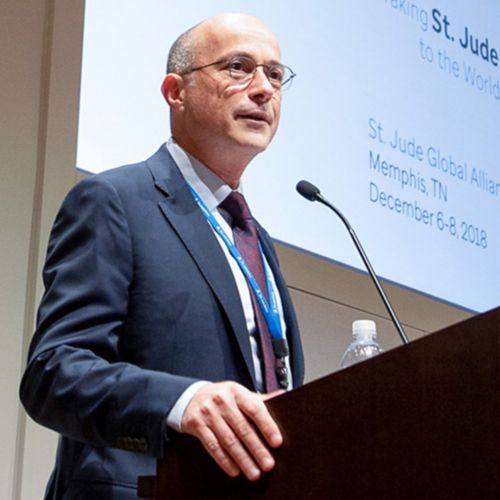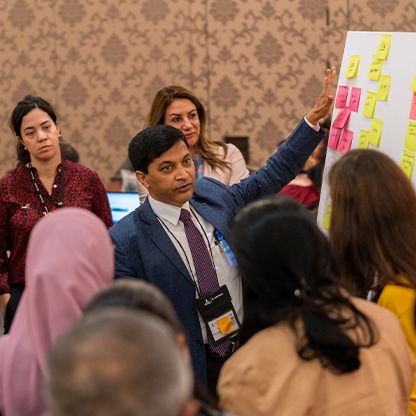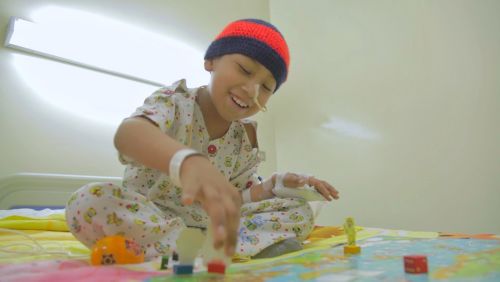St. Jude Family of Websites
Explore our cutting edge research, world-class patient care, career opportunities and more.
St. Jude Children's Research Hospital Home

- Fundraising
St. Jude Family of Websites
Explore our cutting edge research, world-class patient care, career opportunities and more.
St. Jude Children's Research Hospital Home

- Fundraising
Global Scholars: Dr. Jiaoyang Cai
Other Global Scholars Projects:
Dr. Cai focuses on survivor follow-up care in China
Last summer, Dr. Jiaoyang Cai gave a lecture to parents of pediatric cancer patients in China.
Typically, she gives presentations to her colleagues on the long-term effects of childhood and adolescent cancer — reinforcing the importance of following up with patients and their parents after treatment has ended. This time, however, she was meeting with the parents themselves.
At one point, she pointed to Hayley Arceneaux, a pediatric cancer survivor, astronaut, and, currently, physician’s assistant at St. Jude Children’s Research Hospital. Arceneaux, she told her audience, is an example of the heights that childhood cancer survivors can reach. As Dr. Cai put it, “She went to space.”
But toward the end of her talk, the discussion turned toward a more sobering subject: the difficulties families can face. One mother told the story of taking her child to play outside. “Mom,” the child had asked, “why is everybody looking at me so weird?”
The problem, Dr. Cai told them, lies with society and a lack of awareness of childhood cancer. “You’re doing very great,” she told the parents. “Both you and your kids are so brave and strong to go outside and back to your normal life.” It was an emotional moment, she remembers, and some parents had shed tears.

“I want to know the gaps, where are the knowledge gaps for the provider and the caregivers. I want to know what they already know and what their barriers are. . ..” — Dr. Jiaoyang Cai
“That made me [think], oh, I need to help them more,” Dr. Cai says. “Maybe I need some psychiatrist colleague to help me to talk to them, to let them know [what] to do when they’re facing the situation.”
The post-treatment phase of the pediatric cancer journey remains a principal focus for Dr. Cai, an attending physician at Shanghai Children’s Medical Center/National Children’s Medical Center – Shanghai. And as a 2023 graduate of the Global Scholars program, she has dedicated her Scholars Project to identifying and tackling barriers in the transition to long-term, follow-up care for childhood cancer survivors in China.
This interest evolved, in part, from her participation in a large multicenter study of acute lymphoblastic leukemia. The study, conducted by the Chinese Children’s Cancer Group, has included more than 14,000 patients since 2015. “I realized,” Dr. Cai says, “we have more and more patients move to the next step, the next phase. They are survivors. So I think some people need to focus on their long term, their quality of life.”
For Dr. Cai, this need of patients and families went hand in hand with a need for more support from health systems. “Because some parents said, ‘Oh, after therapy, maybe two years after chemotherapy, my doctor said you have no need to come back to the hospital because we’re done here.’ So they asked … where should I take the examination?”
So, in 2019, leveraging lessons she learned over two visits to St. Jude, she established the first long-term, follow-up clinic for pediatric hematology-oncology patients in China.
The clinic has afforded doctors more time — to dive into treatment history, to talk with patients and their families. About things to watch out for. About life in general. “In China, we have a lot of patients in [clinics]. The doctors are very busy. [They are able to] take 3 to 5 minutes for each patient. But … in my clinic they have at least 15 to 30 minutes for each patient. So we talk: ‘How is school? And, how are your friends?’ And I also talk to the parents.”
Parents are often very focused on a possible relapse, she says. But there are other things to be mindful of — and potentially test for. For example, the long-term effects of chemotherapy on a patient’s heart. Or, a patient’s ability to one day have kids of their own. Or, just the need to speak honestly with children about what they’ve been through.
The clinic has allowed Dr. Cai to discuss all these topics with families. But she remains concerned about reaching the patients who aren’t walking through the clinic doors.
Enter her Scholars Project.
“I want to know the gaps, where are the knowledge gaps for the provider and the caregivers,” she says. “I want to know what they already know and what their barriers are to do the survivorship care.”
Dr. Cai’s Scholars Project seeks first to identify the barriers to, and gaps in, survivor care, using surveys and interviews of colleagues and caregivers. She will also use data from the current multicenter study on ALL. From there, she will seek to address the barriers and gaps through lectures and the development of care plans and guidelines.
“I think the most important [group] is the doctors. They didn’t realize the importance,” she says, “so they didn’t pass the message to the parents. So, of course, the parents didn’t realize the importance.”
A mother of two herself, Dr. Cai was drawn to the field of medicine because of her grandmother, who worked as a pediatrician. She remembers people from the neighborhood seeking her grandmother’s assistance. “She was always eager to help them,” Dr. Cai says. “And this let me realize how great this profession is.”
Dr. Cai was drawn to the Global Scholars program in part for the global perspective on pediatric medicine, as well as the chance to gain new clinical and research skills. The leadership training was a highlight, as were the colleagues she met from around the world. “I think that the [friendships] with my colleagues will keep forever.”
She has also gained new confidence as she moves forward, as she takes new steps to help the parents she spoke with last summer.
“I think they are doing very, very good and strong,” she says of those parents. “They are still sad because they are kids. So that’s why … I think I have more work I need to do to help them.”


